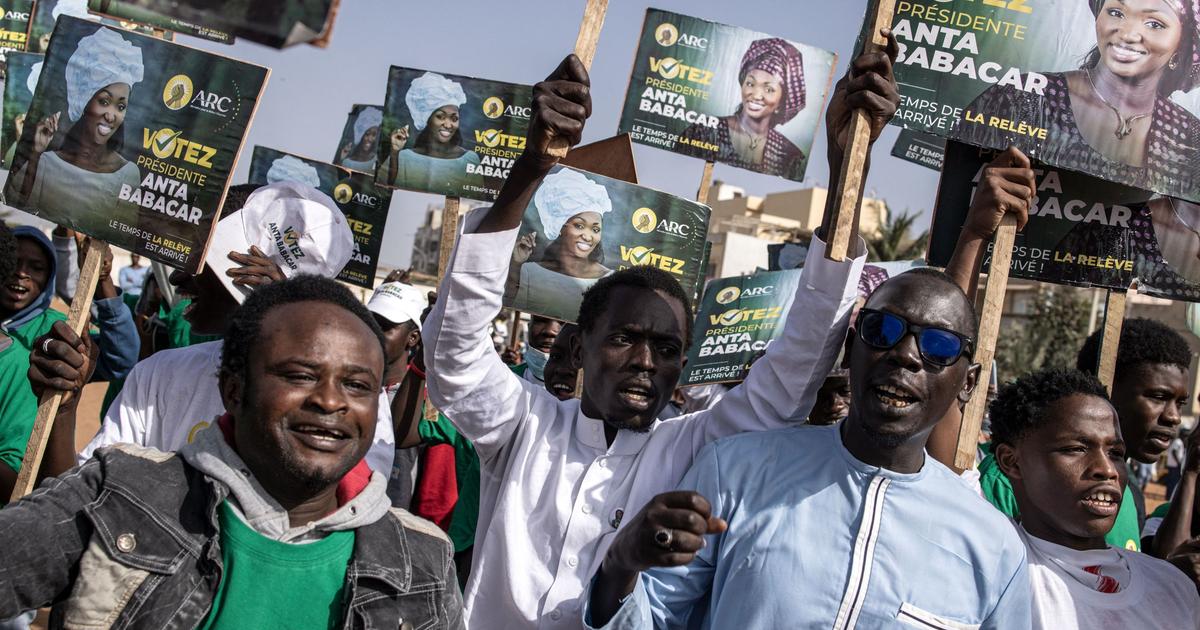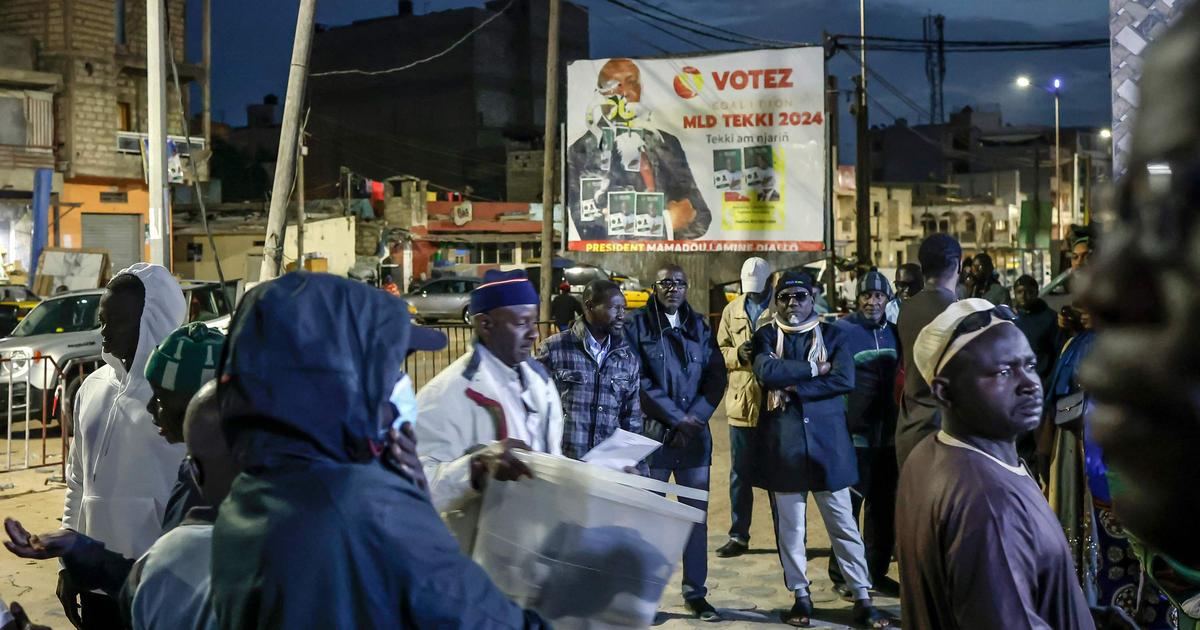A court in Dakar on Thursday sentenced Ousmane Sonko, the main Senegalese opposition leader, to two years in prison and a fine of about 900 euros for the crime of sexual "corruption" of a young woman, a sentence that could exclude him from the presidential elections of February 2024. However, he was acquitted of the crime of rape. Sonko, who refused to attend the trial held last week, has been held by police since last Sunday at his home in the Senegalese capital, which surrounds the building and prevents him from receiving visitors, which had caused numerous riots and clashes between police and Sonko supporters in Dakar. The announcement of the verdict has generated a new outbreak of protests in the capital, as well as in other cities of the country.
An immense black smoke rises from the heart of Cheikh Anta Diop University, in the center of Dakar. A group of students, barricaded on campus, have set fire to tables and other belongings. Barricaded behind the barricade, they throw stones at about thirty police who respond from the entrance with tear gas, whose white and irritating smoke spreads through the area. The access avenue to the enclosure is full of rubble and remains of bonfires. A small bus tries to avoid the obstacles, but the agents stop it and beat the young people inside. No passing.
Plumes of smoke also emerge from other neighborhoods of the city, such as Plateau, Medina, Colobane and HLM, as well as from Cité Keur Gorgui, where Ousmane Sonko himself is being held by the police. The traffic has disappeared, impossible to circulate, and here and there, in the streets deserted of vehicles, more groups of young people with their faces covered confront the law enforcement officers. Identical images from the cities of Mbour, Guediawaye, Pikine or Ziguinchor begin to circulate on social networks and mobile phones. The National Political Council of Sonko's party, African Patriots of Senegal for Work, Ethics and Fraternity (Pastef), has urged all Senegalese to take to the streets to "confront the dictatorial and bloodthirsty drift of Macky Sall's regime."
This was Senegal this Thursday after the conviction of Sonko, after in recent days the tension began to rise with hundreds of young people cutting traffic on different roads by placing barricades or burning tires and attacking private homes of people close to power, which had caused clashes with the forces of order. Dozens of people were arrested, including prominent members of citizens' and opposition movements. Numerous witnesses warned of the presence of armed people dressed as civilians who fired on the demonstrators.
Riot police fire tear gas at protesters on the campus of Cheikh Anta Diop University in Dakar on Thursday. Leo Correa (Associated Press/LaPresse)
In February 2021, Ousmane Sonko was accused of repeated rape and death threats by Adji Sarr, a young massage parlor worker. The opposition leader admitted that he went to this establishment for his back pain, but denied at all times that he had maintained relations, consensual or forced, with the complainant. He also argued that this accusation was an orchestrated set-up from power to exclude him from the presidential race and decided not to present himself to the judicial process, arguing that his safety was not guaranteed. The prosecutor had asked for 10 years in prison for rape, a crime for which he was eventually acquitted, or five for "corruption of young people."
This offence is covered by article 324 of the Senegalese Criminal Code and consists of "violating morals by habitually executing, favouring or facilitating the debauchery or corruption of young persons of either sex under the age of 21 or, even occasionally, under the age of 16". The masseuse was 20 years old at the time she filed the complaint. The penalties for this crime range from two to five years in prison and fines between 450 and 6,000 euros. In addition, Sonko has been convicted in contempt for failing to appear at the trial despite having been notified, which limits his possibilities to file an appeal.
This judicial process has kept Senegal in suspense for the past two years. Already in February 2021, after the detention of Ousmane Sonko for a few days, serious riots occurred throughout the country that ended with fifteen deaths. Since then, the incidents have been reproduced periodically every time the opposition leader, who has significant support from young people, had to go to testify in court, both for the instruction of this trial and for another process against him for defamation, which ends on May 8 with a sentence of six months in prison.
Last Friday, after the trial in absentia, Sonko decided to return from Ziguinchor to Dakar in a convoy of vehicles, which he called "the caravan of freedom". However, on Sunday he was arrested halfway through and forcibly taken to his home in the Senegalese capital, where he had been held ever since. On Monday he managed to videotape and spread a message through social networks in which he claimed to be "kidnapped" and called on young people to "rise up as one man" and "take to the streets en masse" in a "national resistance movement". The authorities, for their part, had assured that they would maintain public order at all costs.
Meanwhile, Senegalese President Macky Sall inaugurated on Wednesday the so-called "national dialogue" with a part of the opposition to try to reduce political tension. However, this process was born weighed down by the absence of the coalition led by Sonko and other important political leaders. At the heart of all this tension is the fact that Macky Sall, in power since 2012, is considering running in the February 2024 elections for a third term, a possibility expressly prohibited in the Constitution. Sall would be eligible to run for having reformed the Magna Carta during his first term, as Alpha Condé in Guinea or Alassane Ouattara in Ivory Coast recently did.
Ousmane Sonko, who was a union leader in his time as an official of the Tax Administration, made the leap to politics in the legislative elections of 2017, when he was elected deputy at the head of Pastef. His political action has been characterized since then by his frontal denunciation of corruption, maintaining an anti-French and rupture discourse. In the 2019 presidential elections he came in third place with a creditable 15%, while in the 2022 legislative elections the coalition he led was about to snatch the absolute majority from Benno Bokk Yakar, the coalition in power, making him the de facto main opposition leader.
Follow all the international information on Facebook and Twitter, or in our weekly newsletter.
Subscribe to continue reading
Read without limits
Read more
I'm already a subscriber









